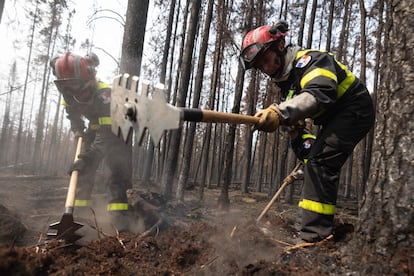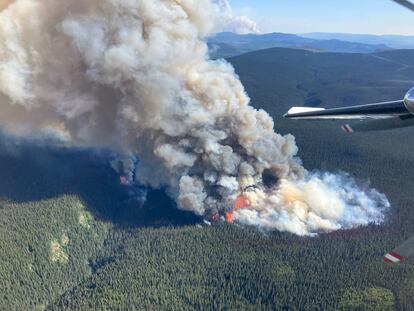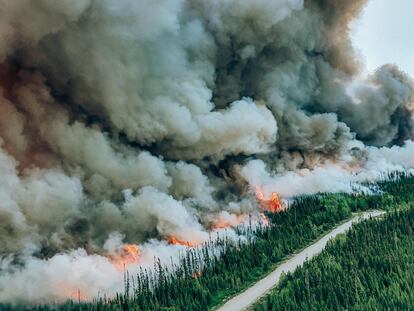Canada, a natural paradise in flames: ‘It’s as if the sky had been stolen from us’
A record wave of fires has burned almost 10 million hectares, forced the evacuation of nearly 160,000 people and caused a toxic cloud that has reached across the Atlantic


According to the residents of Chibougamau, the fires that have been raging in Canada since June have stolen the sky. They are almost over the fright of being surrounded by the fire and dense smoke that made their air unbreathable. Now, they are overwhelmed by the strangeness of being deprived of a horizon each day, as if they were blind. A threatening, thick gray has taken over the sky, while the few rays of sunlight that pierce it have something supernatural about them; they’re not just the simple condition of light. Like Chibougamau, Canada as a whole is a natural paradise under siege by a dreadful wave of fires—the worst in recent history—which has burned almost ten million hectares, forced the evacuation of nearly 160,000 people and caused a toxic cloud, the contamination of which has reached other countries, even ones on the other side of the Atlantic. From west to east, from British Columbia to Quebec, the country is burning.
“I didn’t want to leave; I have lived through many fires. But the smoke was unbreathable. The mayor’s office gave the order to evacuate, and we left. Today, we are fine [and] calm, more or less, but I feel strange; it’s as if they had stolen the sky, which was always blue and clear here. It is as if they had covered the horizon with a layer of cement, “explains Marthe, a retired woman, who lives in front of the lake, where children enjoy the municipal beach—everything here is a display of impeccable public services—and where the reflection on the water’s surface returns only opacity.
The country’s vast, uninterrupted forest mass, which has trees up to 12 meters [about 39 feet] high; the absence of inhabited areas—one can travel hundreds of kilometers without finding a single village—and, therefore, the lack of barriers; drought and unusually high temperatures have given rise to the worst season in living memory, since accurate recordkeeping for fires began in 1986. This week, there were 800 active fires across the country, compared to 640 the previous week. In the province of Quebec, where Chibougamau is located, there were 42 fires on Thursday, all of which are under control.
In total, 9.6 million hectares have burned (1.5 million in Quebec), well above the previous worst figure, when 7.6 million hectares burned in 1989, and 11 times the average recorded in the last decade, according to the Canadian Interagency Forest Fire Centre (CIFFC). The combination of dry storms with strong electrical power and record temperatures, such as the ones recorded last weekend in the western part of the country, have added more fuel to the fires. For example, in the previous week, Canada saw a high of 548 new fires, 406 of which resulted from lightning, according to the CIFFC. So far this year, there have been 3,960 fires in the country.
“The area’s main source of wealth, timber, has become the biggest threat,” says Jean Denis, another resident. “In addition to the toxic smoke, you could see the flames, despite all the firefighters’ attempts to establish trenches around the town by cutting down the nearest trees.” Denis, his partner, and their baby left for Quebec when the evacuation order was given. “My partner works for Quebec’s government, and we left without hesitation; the smoke was unbreathable. We were away for a week; we couldn’t expose the baby [to it].”
At the beginning of June, nearly 7,200 people were evacuated all at once. “Only the municipal staff, firefighters, police officers, a doctor and two aides, as well as minimal service [workers] in hotels and restaurants to serve the firefighters and the military, remained,” explains Manon Cyr, the mayor of Chibougamau, the main entrance to fire #334 (the fires are all numbered). Most of the evacuees ended up in Roberval, a seaside resort some 300 km [about 186 miles] to the south. They slept in the local sports center for several days, and the local population went out of their way to help them, with the blend of efficiency and kindness that defines Canadians.
“Right now, there are only two fires in the area, both of which are controlled,” says Cyr, pointing to two large red diamonds on the map in his office. “In principle, they do not pose a risk to the population, although the most vulnerable people in a couple of nearby villages have been evacuated because of the smoke. Last month, two original [indigenous] communities in the area were also evacuated; at the time, they did not want to leave their land even though they were surrounded by flames.” At the end of June, the carbon emissions generated by the fires reached record numbers, 160 million tons, the highest since 2003.
Cyr has just received the daily report of the military deployed in the area. There are “a hundred [of them], plus a new detachment will arrive soon.” Some 3,790 technicians and firefighters from 11 countries have joined the 3,800 Canadians, who are supported by the Canadian army. The latter number is the sum of deployments from different provinces, because the country does not have a national fire department. That offers another possible re-reading of the human resources on which the country depends to fight this battle, especially when all signs indicate that climate change will increase the duration and intensity of forest fires.
In Canada, 94% of forest lands are public, but their management is distributed over 10 provinces and three territories, all of which guard their jurisdiction very jealously. This arrangement leads to different approaches, from how fire suppression is managed to the size of prevention budgets to the decision of whether or not to cut down dry trees. The always-delicate relationship between Ottawa and the provinces is also put to the test during fires.

Today, Canada resembles something akin to a castle besieged by flames with its fortifications: a line of trenches as a firebreak and a perimeter stripped of vegetation to deprive the fire of fuel. These seemingly medieval methods are the only ones that apply in areas where there is a continuous dense forest mass: the roads and dirt tracks leading to the lakes and numerous wildlife reserves are practically the only firebreaks that exist.
In the meeting room of the Société de Protection des Forêts contre le Feu (Sopfeu; Society for the Protection of Forests against Fire), the non-profit company that the Quebecois government entrusts with managing and extinguishing fires in the province, a giant map details the perimeter of one of the fires. “The bulldozers act first [to open firebreaks] on the strip closest to inhabited areas, if there are any. Then they delimit the rest of the fire by cutting down all the trees around it,” explains Josée Poitras, a Sopfeu spokesperson, pointing to a zigzag that indicates a boundary that has already been drawn.
Rearguard work
Amid the incessant rotor noise of helicopters and light aircraft, Dave Taillon, Sopfeu’s warehouse maintenance manager, confirms that June is always the worst month. “But July is not giving any respite either, comparatively speaking, and we are prepared to hold our nerve until at least October. The size and intensity of the fires indicate that they are going to last all summer.” In a gigantic laundry room, two workers clean the hoses every day, while other employees check motor pump parts after each operation.
Sopfeu’s regional headquarters is located at the Roberval airfield, where the company’s planes and helicopters land and take off non-stop. The rearguard work that takes place there is also striking: the surgical precision of the equipment, the screening of satellites in the screen room, where an Australian firefighter was working on Wednesday, and even the administrative office that is responsible for finding accommodations and food for firefighters who are working in the middle of nowhere. “These are invisible but vital tasks, such as ensuring that the firefighters who travel to the fire every day by helicopter can rest and eat in areas where there is nothing,” says Poitras.
On the endless route to Chibougamau—located almost 600 kilometers [about 373 miles] northwest of Quebec—only the pristine scenery of lakes and forests stands out amid boring straight lines of logging trucks. The toll that the fires are taking on local industry, mining and ecotourism is incalculable, and the regional government has already announced aid and credit lines for companies. For example, Chibougamau has banned camping and fishing, its main tourist attractions, to avoid adding to the risks.
That’s why the high season has been off to a slow start, says Stéphane Travi, the owner of a motel in Roberval, whose business accounts were saved in June by evacuees from Chibougamau. “Nobody would think of coming to enjoy the lake, everything was an orange haze, but the motel filled up with displaced people. That movement gave the town a different life. They paid for the rooms themselves because they preferred the privacy of a room to the sports center, and there was also a lot of activity in the restaurants.” The regional government foots the bill for the Quebec fires, while Sopfeu is responsible for managing and extinguishing them. “Quebec pays for all the operations,” Poitras says.

The combination of extreme weather phenomena in the country in recent days—last weekend, British Columbia recorded its highest temperature, 40 degrees C [104 degrees F]; torrential rains were followed by floods in Quebec; thunderstorms and lightning lit up the gray skies in Roberval and Chibougamau midweek; and poor air quality alerts increased by a lot—attests to the fact that climate change is no longer a threat but rather the new reality. They are the unmistakable alarm bells of global warming.
Although fires are raging across the country from coast to coast (another new phenomenon), as they are brought under control, firefighters can go on the offensive and combat other ones that have not yet been addressed now because of a shortage of personnel and the need to prioritize: the first priority was protecting inhabited areas.
The impact of the fires will shape generations, including the friendly lifeguards on the beach of Chibougamau, who did not want to miss their graduation but had to leave, fleeing from the flames with nothing but a backpack. “There will always be time for a graduation party, right?” one of them joked on Wednesday. They were already active on the lifeguard stands, watching over the children bathing in a steel-gray lake that seems to await the blessing of light.
Sign up for our weekly newsletter to get more English-language news coverage from EL PAÍS USA Edition
Tu suscripción se está usando en otro dispositivo
¿Quieres añadir otro usuario a tu suscripción?
Si continúas leyendo en este dispositivo, no se podrá leer en el otro.
FlechaTu suscripción se está usando en otro dispositivo y solo puedes acceder a EL PAÍS desde un dispositivo a la vez.
Si quieres compartir tu cuenta, cambia tu suscripción a la modalidad Premium, así podrás añadir otro usuario. Cada uno accederá con su propia cuenta de email, lo que os permitirá personalizar vuestra experiencia en EL PAÍS.
¿Tienes una suscripción de empresa? Accede aquí para contratar más cuentas.
En el caso de no saber quién está usando tu cuenta, te recomendamos cambiar tu contraseña aquí.
Si decides continuar compartiendo tu cuenta, este mensaje se mostrará en tu dispositivo y en el de la otra persona que está usando tu cuenta de forma indefinida, afectando a tu experiencia de lectura. Puedes consultar aquí los términos y condiciones de la suscripción digital.








































